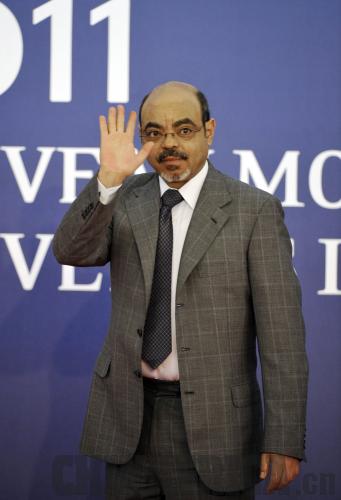|

There's no doubt that Ethiopia's deceased Prime Minister Meles Zenawi was a key cog in the stability, development and security in the Horn of Africa.
His footprints, for the 21 years that he was in power, are written in nearly every conflict, every project, and every effort to ensure that the region was stable and well developed. Despite rumors that he had been in poor health, Zenawi's death on August 20 still caught all the regional leaders off-guard.
He'd missed the African Union Summit in his capital Addis Ababa in late July, and had not been seen in public since then. Reports of his visits to a Brussels hospital being treated for an "infection" fueled speculation that the Ethiopian leader was on his deathbed.
In Africa, when a leader is sick, the official line always exudes hope, to an extent that a terminal illness is dismissed as "an infection." It happened with Ghana's John Atta Mills, Malawi's Mbingu wa Mutharika and Nigeria's Umaru Musa Yardua.
So, when the announcement came on August 21 via the official channels that Zenawi was dead, the enormity of the task ahead for the regional leaders became apparent.
The obvious big question on their minds was "what next?"
Ethiopia, headquarters of the African Union, is a strategic nation in the war against terrorism in Somalia. Its army played a key role in ousting the Islamic Courts Union, which, it is believed, fragmented and some of its elements morphed into al Shabaab.
That Zenawi was the mediator-in-chief when Sudan and South Sudan were on the brink of war is just a pointer of his clout in the region.
Uganda's President Yoweri Museveni, South Sudan's Salva Kiir, Kenya's Mwai Kibaki, and Rwanda's Paul Kagame are some of those hardest hit by the departure of Zenawi.
Ethiopia, Uganda and Kenya are fighting the al Shabaab militia in Somalia in an effort to stabilize that country, which has, for two decades, been at war. Ethiopia, Kenya and South Sudan had agreed to build a key transport corridor – roads, railway and a pipeline - to the port of Lamu on Kenya's Indian Ocean Coast.
The sense of loss and uncertainty has reverberated across the region and regional leaders will be on tenterhooks to find out if the new Prime Minister Hailemariam Desalegn will continue with Zenawi's Panafrican dream. They hope that having been Zenawi's deputy, he perhaps shares the same mindset.
The Kenya-based The EastAfrican weekly newspaper is on record as saying the Horn of Africa's "path to a future of realistic development, peace and stability lies in acceptance and implementation of democratic norms, good governance and sustainable development."
If Hailemariam serves until 2015, when the next elections are due, it will be enough time to judge his credentials.
Zenawi's reign saw the economy grow and poverty dwindle. This year, even with the tough times, the IMF projects a 7 percent economic growth in Ethiopia.
"When you look at the economy of Ethiopia, it is difficult to compare it with the economies of the other countries in the region," said Geoffrey Mauya, a lecturer at Kenya's Moi University, formerly based at the School of Oriental and African Studies in the UK.
Mauya told ChinAfrica that Zenawi qualifies to be called a "benevolent dictator," because, despite his tight stranglehold on power, eradicating poverty was a big priority.
"When he came to power, he changed things for the better, in a general way. The economy grew, poverty dwindled, food production increased, and he even improved the infrastructure. He was not an intellectual economist; he was a practical one. If you look at it that way, he succeeded. But then, when you scrutinize his leadership, you start seeing gaps, and end up with a conclusion that it was terrible," Mauya said.
Mauya said the "field" for regional leadership was "wide open" with no automatic successor to take Zenawi's mantle in this regard.
The problem with Ethiopia is that the country is fragmented along ethnic and religious lines. There's the Oromo Liberation Front, in the south, which has been in the trenches fighting to secede and form a new country called Oromia. Then there are the Ogaden Somalis, the Sidama, Afar and Gambela factions. All these have their own issues with the government, and they do not have very good things to say about Zenawi's rule.
The Oromo, for example, celebrated, as they termed the 21 years of Zenawi's rule as a "continuation of war, conflict, gross human rights violation, imprisonment, disappearances, killings and starvation."
Mauya said Zenawi perpetuated exclusion and marginalization to areas that did not support him and the biggest challenge in Ethiopia now is to bring together all the communities.
The region's expectation is that a stable Ethiopia will lead to a stable region for the time being. Africa waits.
(Reporting from Kenya) |